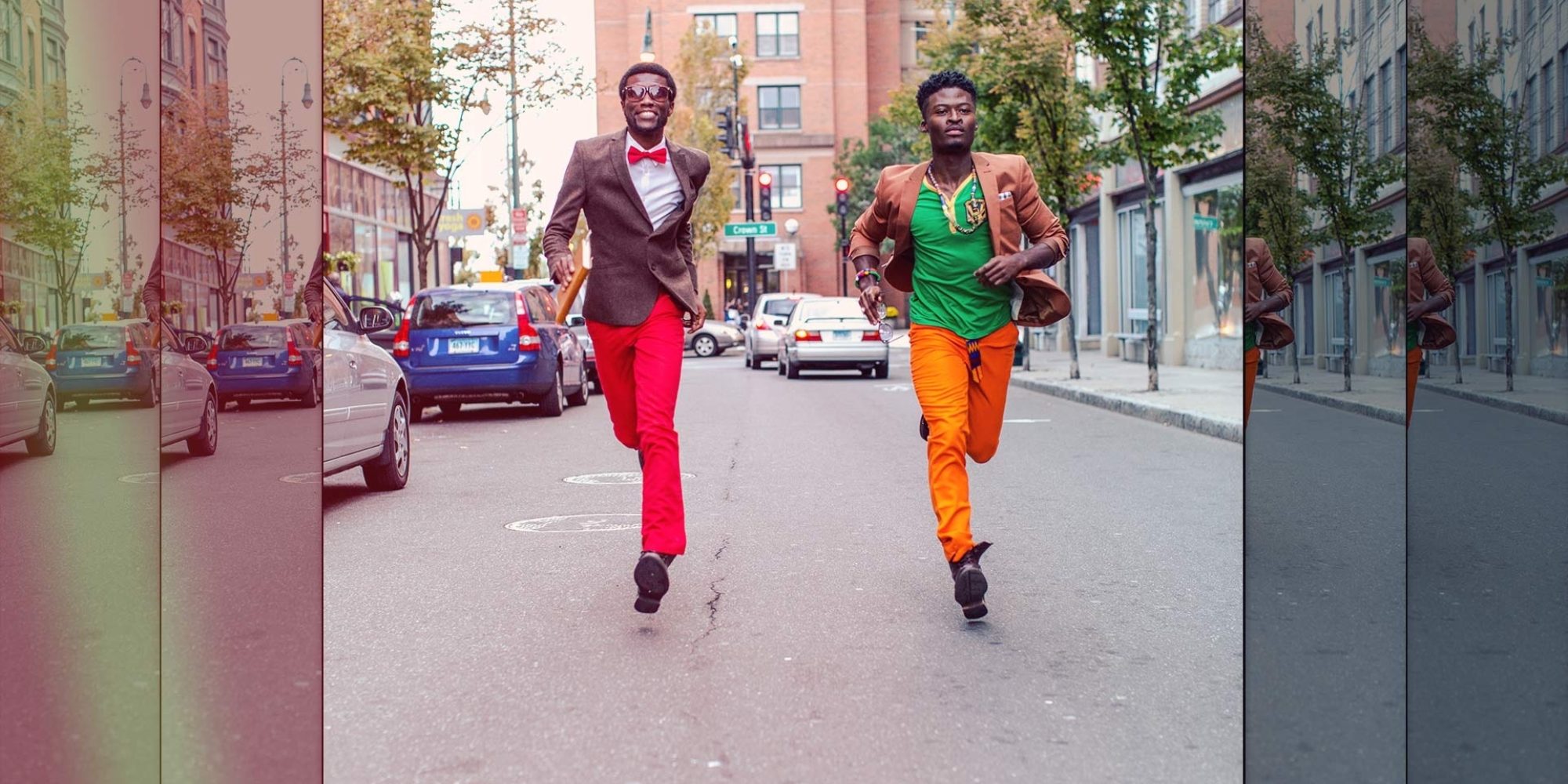54 Kingdoms is a small local fashion company created and run by Nana Poku and Kwaku Awuah, two purpose-driven designers and entrepreneurs born in Ghana but living in Connecticut. The two grew up a short ways from each other in Accra, but didn’t actually meet until 2006 in Connecticut. With a shared vision for reshaping the idea of African fashion and using it to educate, empower and motivate, they cultivated 54 Kingdoms (for the 54 nations in Africa). The company pairs clothing designed in-house—dresses, socks, pants, sweaters—with stories of culture, migration, creativity and societies in Africa and the diaspora. As they explain it, they challenge the status quo of African fashion, largely seen as defined by colorful prints, “by putting storytelling at the center of its designs, where every thread and stitch tethers the consumer to the shores of Africa and beyond, without explicit use of prints and textiles.”
Their “Maasai Dress” bears a minimalist design inspired by a Maasai shield from East Africa; their “Coptic Soles” socks are colorful pieces inspired by the long history of knitted socks in Egypt; their “University of Afrika Sweater” is a preppy, university-style sweater with an imagined university logo paying homage to Timbuktu, Mali, as a renowned center for education and scholarship in the medieval era.
Part of 54 Kingdoms’ process is hosting an annual “Storytellers in Fashion” event with artists, comedians, poets and musicians to convey contemporary African stories in various mediums. This year’s event was a small gathering at DROM in New York City featuring Congolese-American singer Rafiya, Haitian-American poet D. Colin, and Nigerian comedian NaMÓ. Throughout, Kwaku and Nana discussed their designs and the stories behind them and gave love to their friends in the audience.
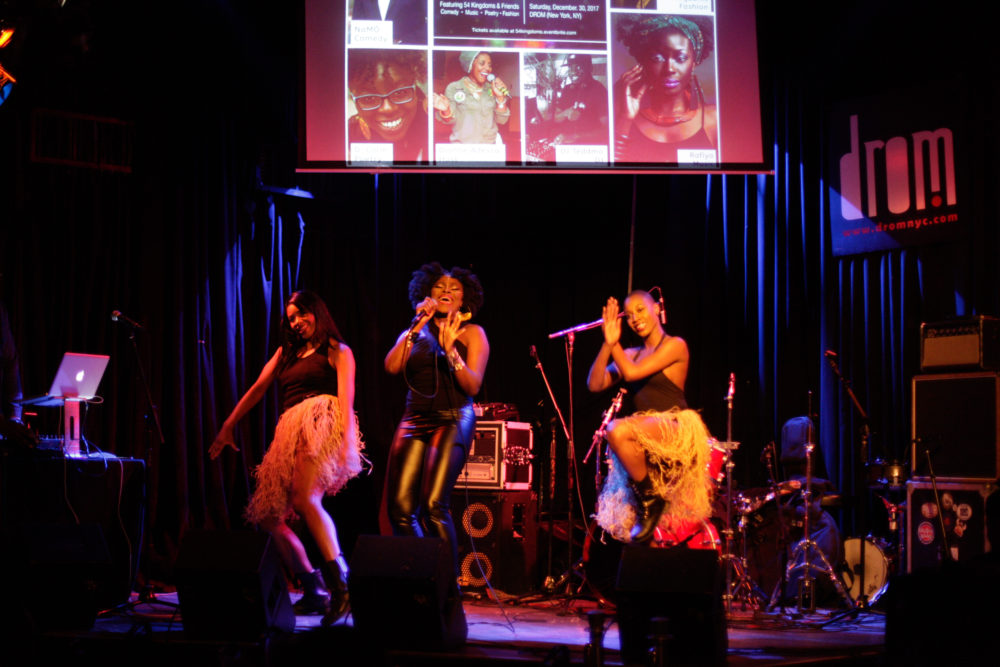
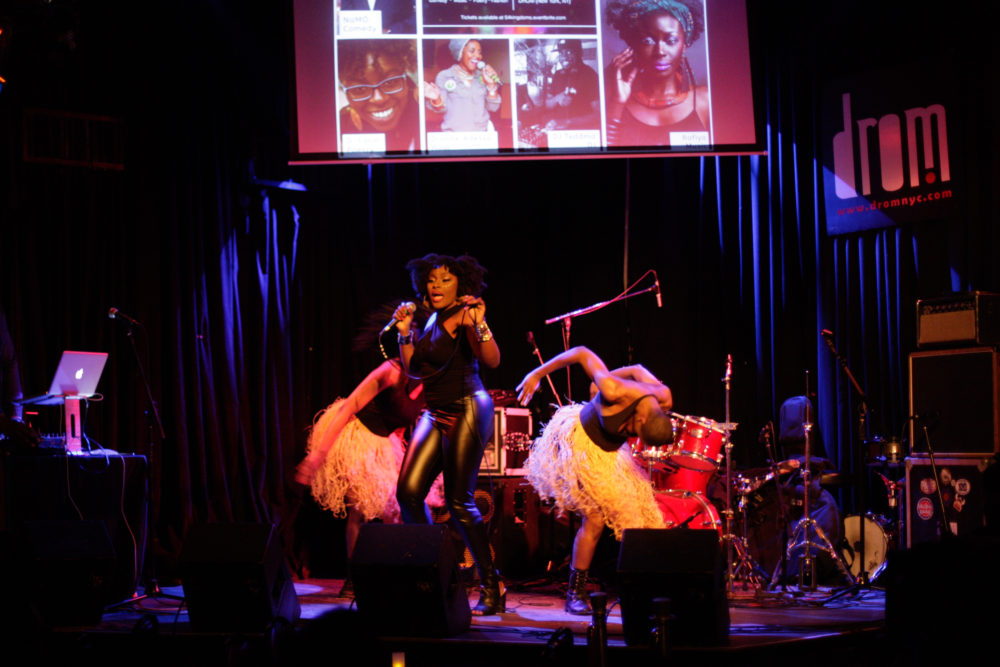
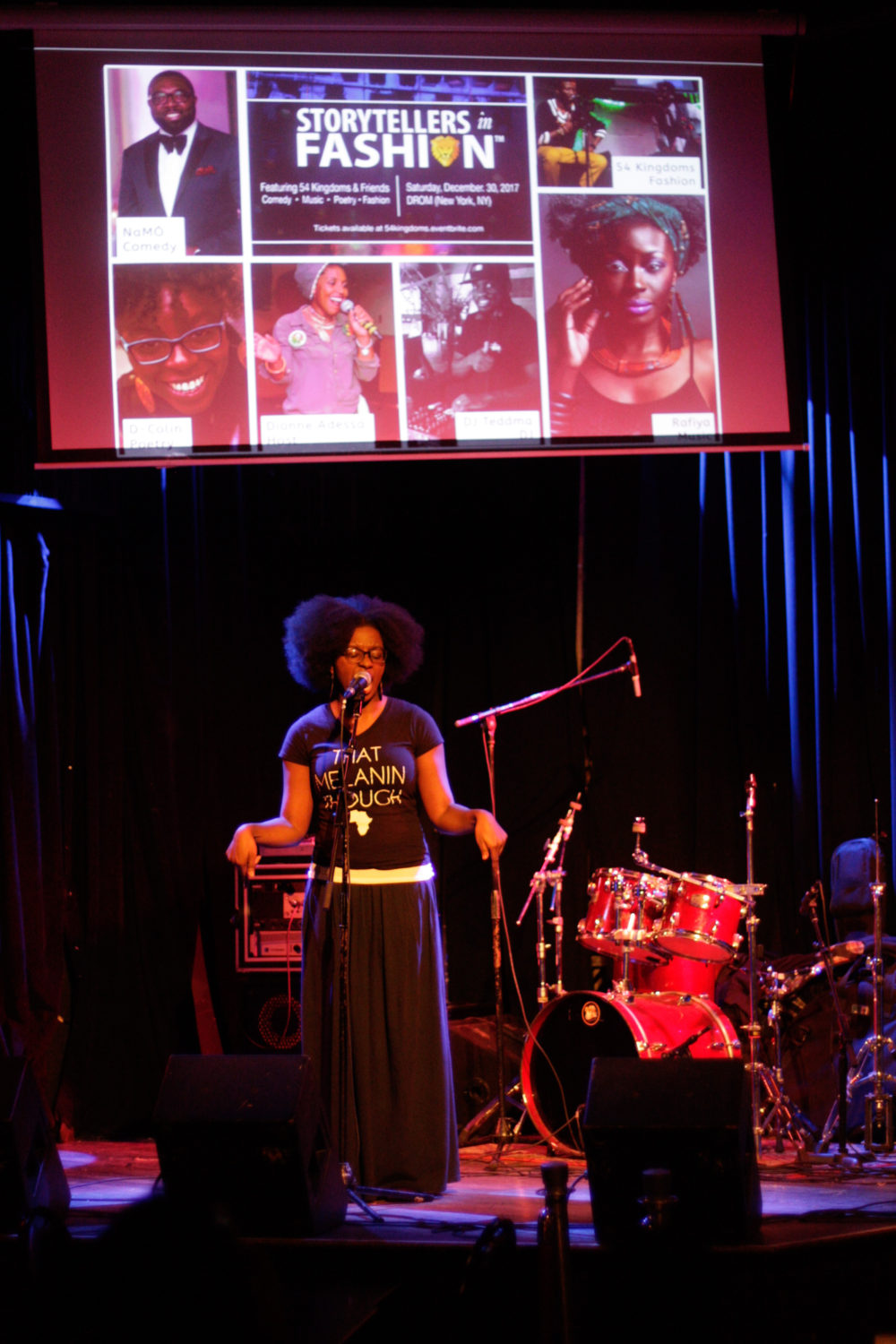
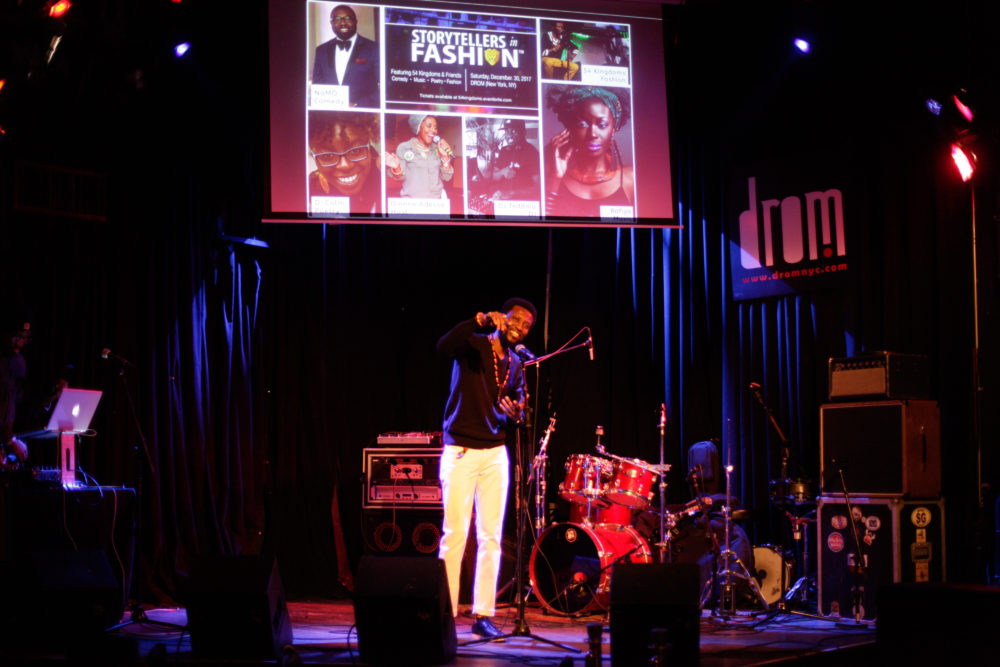
Before the event, we had a chance to talk over the phone with them about their work with 54 Kingdoms. Head over to their website, 54Kingdoms.com, to read more and check out their products.
This interview has been edited for clarity. Photos of the event by Sebastian Bouknight; Product photos from 54 Kingdoms.
Sebastian Bouknight: Hello! Can you introduce yourselves, tell me who you are and what you do?
Nana Poku: My name is Nana Poku, I am the CEO and founder of 54 Kingdoms.
Kwaku Awuah: So I’m Kwaku Awuah, and I work for Nana, pretty much.
Nana: [Laughs] Don’t believe him.
[Laughs] So how’s it going?
Kwaku: It’s hectic because we have the event tomorrow and Nana and I are putting the final touches on things. So it’s exciting but at the same time it’s a lot of work but so far so good
Nana: Yeah, five years in the making!
Five years?
Yeah, so this is the fourth time in five years we’ll be holding this event.
What’s going to go down?
Nana: So tomorrow we’re going to have pretty much a combination of performances from our friends in the arts: comedians, musicians, spoken word. They come on stage, they tell their story, what inspires them, how we’ve worked with them in the past and then we come on and give the final push, thank [everyone] for coming to see us. And most of the time we do an unveiling of a collection we have coming out the upcoming year. Great food, great drinks, great people.
Fun! I saw Rafiya is singing. You’ve had a long relationship with her, right? From the [Score For Unity] jersey you did for the World Cup in 2014?
Yeah, our collaboration with Rafiya goes way back before that actually. We met Rafiya back in 2011, we actually were raising funds for community work that we were doing in Haiti and she was one of the performers that we had on stage to support. She was actually one of the first performers in the first fashion showcase back in 2012.
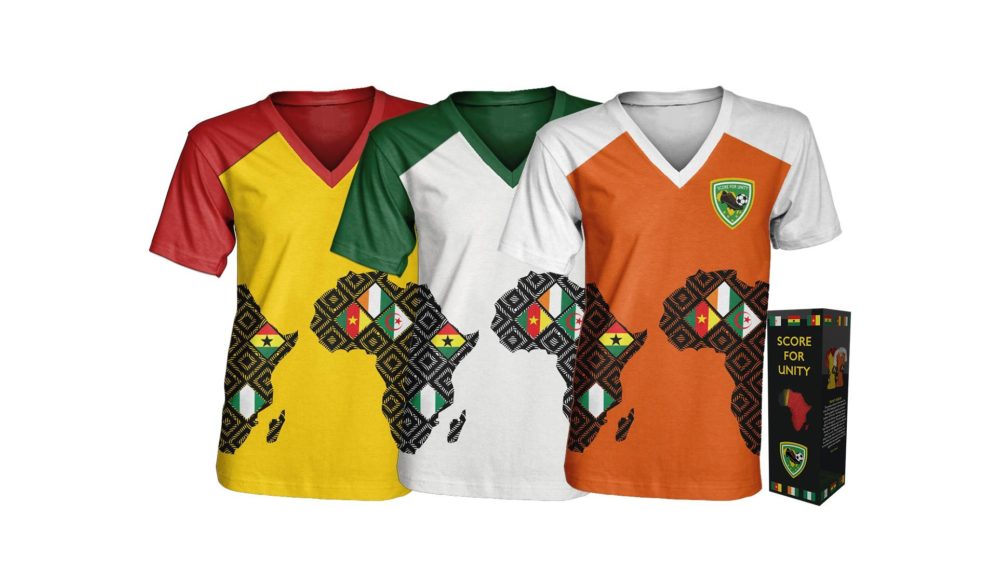
Oh great, I’m looking forward to see her. You mentioned that you were raising funds for Haiti. Can you talk more about that?
Kwaku: Well, you know, following the 2010 earthquake [in Haiti]…it really hit home for Nana and I because we have a lot of love for our brothers and sisters in the Caribbean. Our company is based on the notion of raising and uniting all Africans, irrespective of where we are, [of] bringing people together. You could say we’re pan-Africanist in that sense. It was a tragedy for this to happen and Nana and I wanted to find a way to help. So we paired up with an organization that has a school in the Bel Air area in Haiti that was completely destroyed because of the earthquake. The idea was to rebuild the school, so we leveraged our platform by bringing artists together and putting together concerts to raise funds and support the reconstruction. We took a trip down to Haiti with the Edeyo Foundation…we met all the kids in the school that got affected, we spent some time with them, we helped clean around and, at the end of the day, we presented the donations that we [brought to] assist with the reconstruction.
Wow, that’s really great! Have you continued to do things like that? Do you incorporate projects like that into your work?
Yeah, the company has a community outreach initiative—the whole notion behind it is to partner up with nonprofit organizations doing the work on the continent and in the diaspora. Nana and I have areas of interest as far as giving back—we’ve identified core areas like education, agriculture, sustainable energy, HIV/AIDS. And currently we pair with an organization in Ghana called Girls Education Initiative Ghana run by Elizabeth Paterson. And then in the U.S. there is the African Youth Excellence program, an organization that Nana and I serve on the board for. And all of these organizations have benefited somehow from Storytellers in Fashion. All of the funds that come out of these events, after all expenses have been paid—we make sure a portion of that goes towards the Education Initiative.
Very cool! So you’re approaching the work from a holistic standpoint. Briefly, how did 54 Kingdoms come to be?
Nana: 54 Kingdoms has its roots all the way back in 2006, when I was at school at Central Connecticut University…I used to work on campus at a place called the Center for Africana Studies and [met] lots of individuals from the diaspora—we had the same stories, whether it was folklore or the food that we eat…But we can’t identify those similarities just in a conversation with somebody. Some of the stories that we share—the folklore or history about the countries—[I thought], “Why don’t you just put it into something, into some kind of vehicle? And then [people will say], “What does that mean? How did that come about?” And at least you start a conversation. 54 Kingdoms is a whole idea about sharing stories. When you realize how close you are to somebody standing right next to you but you had no idea…It is that communication that’s really key to 54 Kingdoms. So that’s how it all started off. It’s kind of blossomed into where we are now—we give back as much as we possibly can and we always look for the next story to tell.
So the idea is to start conversations. Do you think fashion can inherently tell stories visually? Or do the stories have to come out of conversations around those clothes?
Nana: Right, I think from the creative standpoint, it depends on how you present that story. I mean, literally, you a can take words and throw them on a shirt creatively and...also it could be the way that you put things together: the color, the symbols, icons…that could start a conversation: “I like that design that you have, the hem of the dress—Does that mean something?” It takes two forms as far as how you want to bring your story to the consumer. Do you want to put at least something that says what it means, or do you want to present it as it is without them having to work too hard for the story?
Kwaku: To piggyback on that…I just wanted to say that we are the storytellers through fashion. Nana is right, it’s all about the presentation. We always think things through a little bit deeper on this end and we focus on our presentation because it’s the first thing that might strike up a conversation with someone.
Nana: No matter what piece we produce, we think that fashion should have an aesthetic to it, because you personally buy things because they look good to you, right? So we kind of correlate our process to baking a cake. At the end of the day you’re going to have the cake, which is the base…and then [we put] layers on top of that. After that it should tell a story. The icing on the cake [makes] you say “It was a great cake, but it has that extra oomph to it.” Sometimes we have a story and [we think] “What’s the next piece we can do to match to it?” Or it could be the other way around—we have a product and we want to bring it to market but we feel that this product needs a soul, so we try to find a story for it.
Very interesting. I don’t think there’s any piece of clothing that could stand in a vacuum and really mean anything, you know?
Right, and it’s kind of like how a musician has a certain emotion that they want to convey, but it also [matters] what instruments they use and also which words they use to convey that [emotion]. So the story…depends on which medium you use to best convey that emotion.
Kwaku: And we chose probably one of the most challenging mediums that you could do [Laughs].
[Laughs] Yeah, definitely. And it’s challenging too to do it in the way that you do, to subvert the idea of what African clothing is. Your clothes don’t jump out loudly as “African fashion” because the idea of African fashion is so limited to wax prints and dashikis and things like that.
Nana: Definitely. And that is the status quo that…we’ve been challenging since 2009. It’s not about the prints and it shouldn’t always be about the prints. Because, you know, we have to understand that whatever we define as our fashion is the perception that the global audience is going to have, right? So if you ask anyone that’s not from the continent what African-inspired fashion is, they’re going to say “Oh well, the prints,” you know? But for us, what we’re saying is, “No, that’s not African-inspired fashion,” because the continent itself and the pan-African diaspora…is more than the prints. We have a rich history, we have unique symbols—if you go to West Africa alone, you have hundreds of symbols which tell a story. And all of these should be utilized from the creative standpoint as a mechanism to tell an African story. So, you know, I guess you could say that we’re taking on that challenge of fighting this whole perception of what African-inspired or pan-African-inspired fashion is.
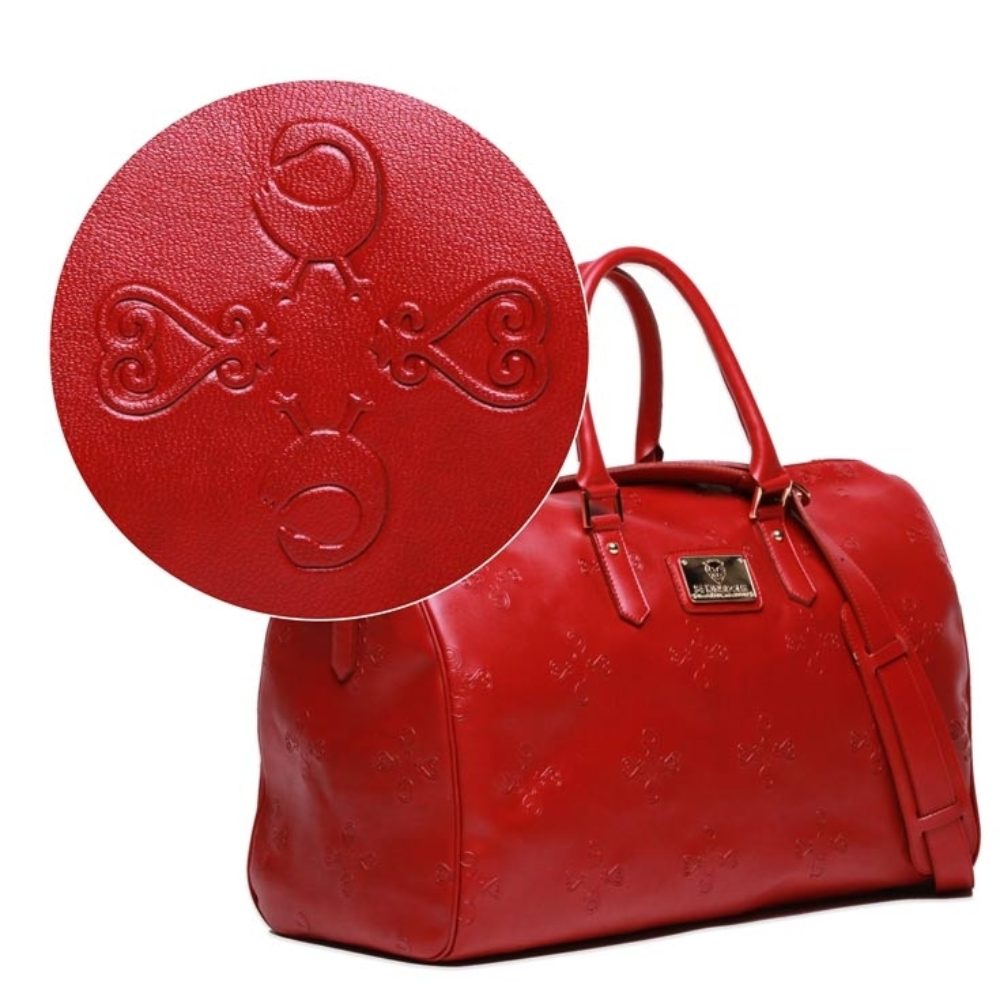
I think also you have good company with the sapeurs of Congo, who are very much doing their own thing and defining a new kind of African fashion, you know?
[Laughs] Absolutely.
Have you found that people sometimes just don’t really get it or aren’t receptive to it because they expect something else?
Oh yeah, absolutely. That’s something we have all the time. But I think that’s what makes it fun. Because if everything came easy from a company perspective—I mean it’s great to have the money come easy—but I think that it gives you more of a reason for why we do things; the impact that we want to leave behind. It’s something that we’re going for and if people don’t get it…I mean when the Internet came out people didn’t get it, when cell phones that had texting came out people didn’t get it. And look where we are now.
Kwaku: And that’s also partly why we created the Storytellers in Fashion platform. I think the unique part about all of this is that, when people go on our website, they can read our story, read the descriptions of the products from there, but Nana and I both do a very exhaustive creative process and [there are] different stories that come out that people don’t get to hear about. So the platform that we created really gives us the opportunity to educate people more and I think that’s when people really start getting it. Before, we were involved in some fashion shows here and there and our products would go onstage without their significant meaning and people wouldn’t really care for them because they didn’t know the background story. But now they do because they can really sit down for a good amount of time and hear the story and the inspiration and history and…all that.
I was reading on your site, Nana, that when you started, you recognized that you had a lack of adequate education about Ghana’s culture and history.
Nana: Oh, absolutely, absolutely.
So when you two were young, what stories were you told and what stories were you not told?
The thing is that we were brought up with culture and with folklore, like the Anansi stories, [stories about] slavery, but even then…it was kind of glanced over. But the African Union, Kwame Nkrumah, the whole entire party, that whole entire movement—that was also glanced over. [Not] until I moved away from the continent...and [educated] myself that I realized the connection I had, not just to my ethnic group in Ghana, but my brothers and sisters outside the country—to Togo, to Nigeria, to Zimbabwe. [I thought] “Man I wish these things were taught to us so that we can appreciate our history more and appreciate how much more we have in common.” And that’s truly what I believe education was lacking. I don’t know how it is now because I haven’t been in school in Ghana in a very long time, but we weren’t even allowed to speak our own languages in school. That by itself severs that link, that lineage, that culture that you can identify with. So if you don’t get to learn the other languages of the other ethnic groups around you, how can you then connect to your own country, because you always identify yourself as a colony of Britain versus being Ghana or being the sister of brother to somebody in Togo, [or] Ivory Coast. So that was a big perspective change, when I came away from the continent I realized that there was so much more to myself and also those that come from the continent.
Kwaku: Yeah, so what I would like to say on that is Nana never really paid attention in school.
[Everyone laughs]
I’m joking, I’m joking. One hundred percent on the same page with Nana. The truth of the matter is that you can’t see the picture when you’re in the frame. Sometimes you have to get out of the box to realize…what you are made of and what the surroundings that you come from are made of. I’ve always wondered why we never got exposed to our neighbors—when I talk about neighbors, I’m talking about all the countries on the continent. I never understood why we never got the history of all the countries in school. We never learned what Kenya was like and what Kenyatta was fighting for. I needed all of that as a kid—the African lore—but those things weren’t exposed to me. Like the first time I heard about Marcus Garvey was in a song. The song mentioned Kwame Nkrumah and Nelson Mandela and then he mentioned Marcus Garvey and I’m like, “Who is Marcus Garvey?” If I wasn’t a young boy that was curious and interested in my history and our people’s history, I probably wouldn’t have done that research into who Marcus Garvey was. [For] a lot of the young people growing up, it’s going to be very difficult to grasp anything if those kinds of fundamentals are not placed right in front of them early on.
Right, definitely. So are you marketing your clothes, and thus those stories, to people on the continent? To people in America? Where are these products and stories directed?
Nana: It’s mostly in the U.S. because that’s where Kwaku and I pretty much reside for right now. But we also need traction on the continent. But the thing on the continent that we’re dealing with is human psychology. Because you know they say that the prophet is never accepted in his own home? So it’s easier for someone in the continent to take up a Gucci product and pay thousands of dollars for it than it is for them to take up something that has their own story attached to it and pay less than 100 dollars. So that’s psychology that we’re dealing with. But we know that that’s how it’s been, for example with Bob Marley—once you’re accepted somewhere else…you’re home will claim you as their own. So that’s really what we’re dealing with. We always take the story first, cause at the end of the day the product will come and go but it’s the story that’s going to last. So we always have respect for that.
Kwaku: Absolutely. Everything that we’re doing, like Nana explained; it’s on the same trajectory as our past heroes…It’s important, the work that we’re doing, and the human psychology is hard to change. But once we break that barrier here, off the continent, it will probably be easier to come back to the continent. Hopefully it’s not too late [Laughs].
Do you have stories of people reacting to your products in the way that you would hope they would? As in, learning something, being empowered, connecting to others, etc.?
Nana: Oh yeah, yeah we get that all the time. [In one of the Storytellers in Fashion videos]… somebody in Brooklyn saw a product and they didn’t believe that it was made by us and when they really found out the story behind it, it just blew their minds. And we still get that reaction from the products we produced. And for us, that’s the pinnacle, like this is really what we fight for, this is really why we wake up every day and create the products we create; it’s to get this reaction. So we still have that feeling.
That’s great! I saw that you’re actively seeking investors on your website. Do you have people on board helping you build your business?
We’ve had a chance of sitting down with investors and also, from a state perspective, having grants coming in. Once you start going through the process, that’s when you really start to realize the bureaucracy that you have to deal with. So the state and these large organizations didn’t help out but we really haven’t had too many chances of individuals, but the ones that we have sat down with…might not be investors but they’ve also been in the fashion line and they’ve given us great feedback and used that to bump to the next level. But I think that when you sit down with an investor, it’s more so: “Do they get it?” As a business you have to define yourself—are you in just for the finances or for an investor who understands exactly the change that you’re trying to implement? So when things aren’t going good, they might say, “You know, I understand your vision, I see your vision, I’m there with you guys.” But you know actually, looking back, Kwaku and I would honestly say that we are happy that we did not get an investor at the beginning because I don’t think we would appreciate the struggle that we’ve gone through now. And having somebody’s money in the beginning when you start your business, it’s a lot riskier than using your own money…and realize the mistakes that you’ve done. Now, if somebody comes to the table, we know what works, we know what does not work and we’re prepared for it. We’re always looking for an investor but more so we’re looking for the right investor, you know?
Right. And if you get the wrong investor, they might try to take control aesthetically and such, right?
Exactly.
Kwaku: Fashion is the avenue that we are using to do the work that we want to do, but it goes beyond the aesthetic. It’s human interaction, it’s about our consciousness and...about [and] for our people. So whenever you sit down with people to talk about business and they get the feeling that, “O.K., there’s a revolutionary aspect to it,” it’s not always…[what they want]. You know we just want to have the right people on the team who appreciate what we’re trying to do because I want my children to live in a world where they feel like they know who they are, that they can actually see their ancestors and what they’ve done, go to different parts of the continent…and learn more. And that’s the legacy that you want to leave behind. It’s not always about how much is in the bank, because money can run out—it’s really the institutions you’re able to build while you are here so they can carry on
Nana: I know that Fela came to Ghana different times when his music was starting off and…he met with one of the highlife musicians. They were talking about music and how the industry is and the Ghanaian artist told Fela, “I don’t understand why you talk about politics. Just make music that makes the people feel good.” I mean there’s nothing wrong with that, but Fela also identified that [he] can make music feel good—you can still dance to it—but there’s also a message that goes along with it too, you know? So that’s the current. So…I think sitting down with the right investor and learning that it’s also revolutionary, not just products…it gives a different side to the story, different side to the prism. [People might ask] “Why don’t you just produce fashion, just clothes, things that people can wear, but I say…there’s more than the piece that you see. It can do a lot more than that to make people feel good.
Absolutely, clothing can be very political. What are your visions for the company five years down the line? Where are you hoping it to be?
You know, one of my visions is to have Storytellers in Fashion on Netflix. [Laughs]. It’s the next avenue for a lot of the young generation, people are getting more into the streaming services and I think we can educate a lot more people that way. But as far as the company itself goes, I know that we want to be a fashion think tank, you know? We want to create an institution that’s all about storytelling through fashion, bringing creatives to the table and giving them the tools to do what we set out to do. And really breaking this barrier of what African-inspired fashion is [in] the global perspective.
Kwaku: I think also to get into the education system. You know…[to] have a catalog, so you can open it up and say here’s a story from this part [of Africa]… that has African roots to it. So yeah, to be able to open up a book and kind of teach a curriculum.
Oh wow, so the catalog is kind of a textbook too?
You got it, you got it.
Very cool. So on the back end, I saw you have some things manufactured in Ghana and Greece—what do you have manufactured in those two places?
Nana: In Ghana we get most of the jewelry that you see on the website. I don’t think all of the jewelry is on the website, but Ghana is primarily where we source the jewelry from. We went to Greece to produce the [Coptic Soles] socks.
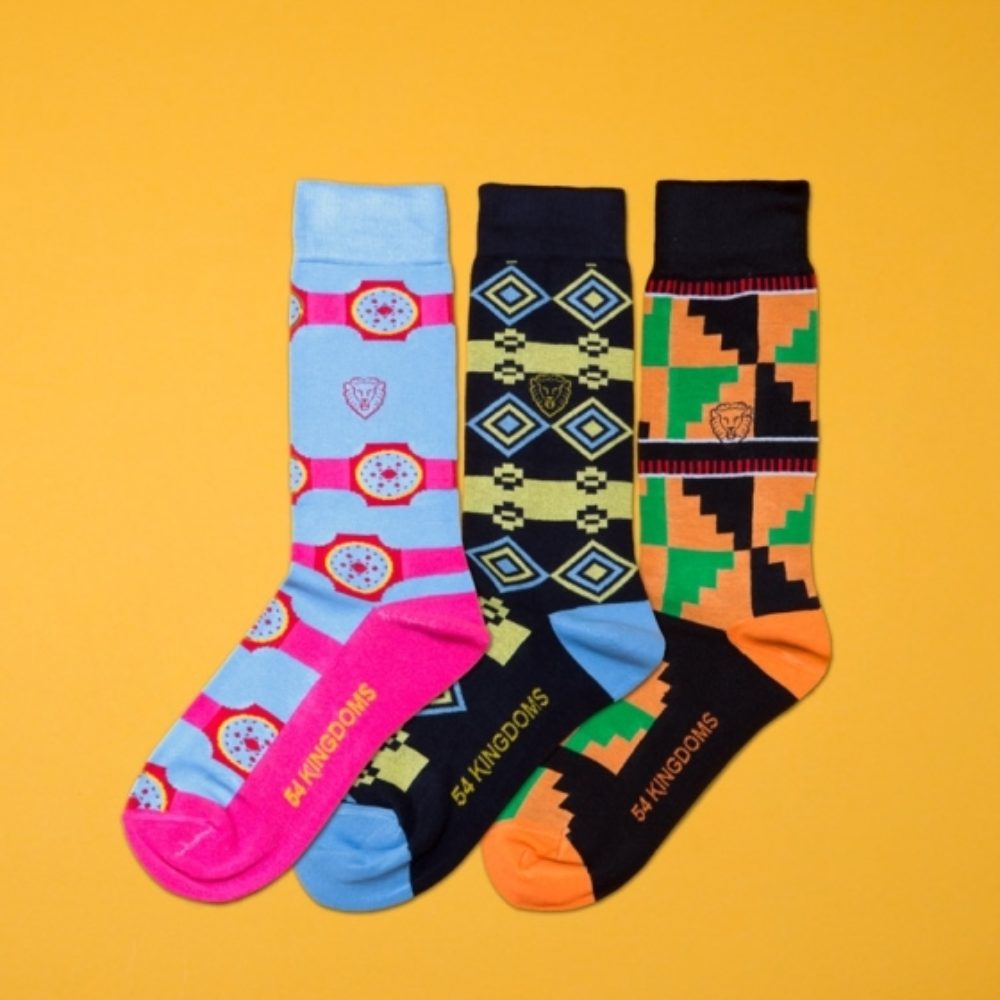
Nana: Egypt was where we actually meant to produce them, because there was the alignment perfectly with the storyline for the sock. The only reason we went to Greece was that…unfortunately, the company that we wanted to produce with had…issues that that we ran into. The first problem that we ran into is that…because they’re on a small scale, they didn’t have the equipment to handle the intricacy of the design. Or if we did find a company on the continent that could produce the piece that we wanted, they only want to cater to large institutions, [like] Gap. They want people that can produce 5,000 pieces at a time in one color and that’s how they run their business. But small companies, we can’t meet those requirements so then we’re left to…find another solution to get our products to market. And then…hopefully later, we come back and say “Hey, can we work with you now?” [Eventually], we want to produce our clothes on the continent.
Ah very cool. Well, I’ll let you go now. Best of luck and thanks for taking the time to talk!
Thank you so much for your time!







